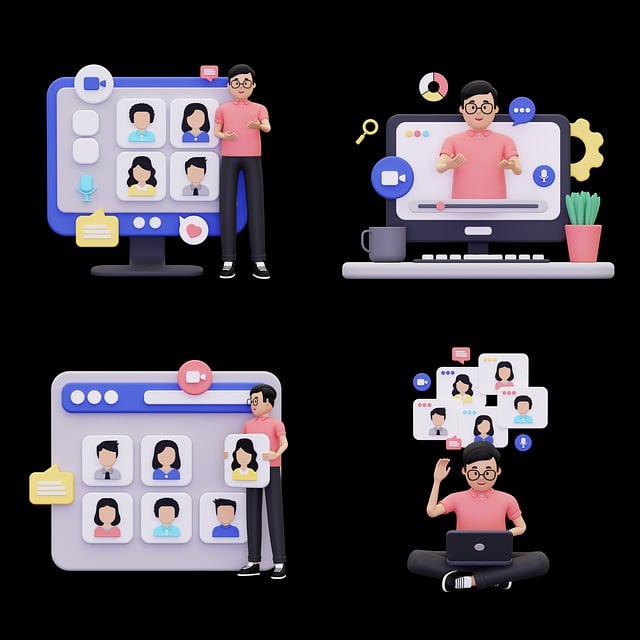AI chatbots online are revolutionizing customer support across industries by providing instant, efficient assistance 24/7 via natural language processing (NLP). Their cost-effectiveness, round-the-clock availability, and ability to learn from user interactions drive their growing popularity. Integrating these virtual assistants into service strategies offers numerous advantages, including personalized experiences and reduced workload on human representatives. Rule-based and machine learning chatbots cater to diverse needs, with machine learning models enhancing accuracy over time. Implementing AI chatbots strategically maximizes benefits, while future advancements in NLP and machine learning promise even more intelligent and intuitive interactions across industries.
“Experience the future of customer support with AI chatbots online: a growing trend transforming traditional service. This comprehensive guide explores the multifaceted world of artificial intelligence-driven assistance, highlighting its immense benefits in enhancing user experiences. From understanding the technology behind these chatbots to implementing them effectively and envisioning their future impact, we delve into the key strategies and innovations shaping the industry. Discover how AI chatbots are revolutionizing customer interactions.”
- Understanding AI Chatbots for Support: A Growing Trend
- Benefits of Online AI Chatbots in Customer Service
- Types of AI Chatbot Technologies and Applications
- Implementing AI Chatbots: Strategies and Best Practices
- The Future of AI Chatbots: Innovations and Potential Impact
Understanding AI Chatbots for Support: A Growing Trend

AI chatbots for support have emerged as a growing trend, revolutionizing customer engagement and service across various industries. These intelligent virtual assistants leverage advanced natural language processing (NLP) technology to understand and respond to user queries in real-time, making them increasingly popular among businesses aiming to enhance their online presence. With the rise of e-commerce and digital services, ai chatbots online are becoming a 24/7 solution for customer inquiries, from simple FAQs to complex issue resolution.
They offer numerous benefits, including cost efficiency, round-the-clock availability, and improved user satisfaction through immediate responses. Moreover, AI chatbots can learn and adapt based on user interactions, continually improving their performance over time. This evolution in support technology is reshaping customer expectations, driving businesses to integrate ai chatbots into their service strategies to stay competitive in the digital landscape.
Benefits of Online AI Chatbots in Customer Service

The integration of AI chatbots into customer service has brought about a significant transformation in the way businesses interact with their clients. These intelligent virtual assistants offer numerous advantages, setting a new standard for efficient and effective support. One of the key benefits is their accessibility; online AI chatbots are available 24/7, ensuring customers receive immediate assistance regardless of time zones or staffing schedules. This round-the-clock availability can greatly enhance customer satisfaction and loyalty.
Moreover, these chatbots provide a personalized experience by leveraging natural language processing to understand and respond to queries. They can handle a wide range of customer inquiries, from basic product information to complex troubleshooting, reducing the workload on human customer service representatives. By efficiently managing common issues, AI chatbots free up resources for more specialized tasks, allowing businesses to optimize their support operations and deliver an improved overall experience.
Types of AI Chatbot Technologies and Applications

AI chatbots have evolved significantly, offering a range of technologies that cater to diverse needs. Primarily, they can be categorized into rule-based and machine learning models. Rule-based chatbots operate using pre-defined rules and scripts, providing structured responses based on user inputs. These are simple yet effective for handling basic customer inquiries and tasks like booking appointments or providing product recommendations.
On the other hand, machine learning chatbots use advanced algorithms to learn from user interactions, improving over time. They can understand natural language processing (NLP), enabling them to interpret complex queries and deliver more accurate answers. Machine learning models are versatile and adaptable, finding applications in customer service, virtual assistants, personalized tutoring, and even creative writing assistance. With their ability to handle a wide spectrum of user needs, these AI chatbots have become indispensable tools for businesses aiming to enhance online support systems.
Implementing AI Chatbots: Strategies and Best Practices

Implementing AI chatbots is a strategic move for businesses aiming to enhance customer support and engagement in the digital age. These intelligent virtual assistants are designed to handle a multitude of tasks, from answering frequently asked questions (FAQs) to guiding users through complex processes. When introducing AI chatbots online, organizations should consider a structured approach that aligns with their unique needs. One effective strategy is to define clear use cases, ensuring the chatbot addresses specific pain points and high-volume queries. For instance, an e-commerce platform might utilize an AI chatbot for order status updates, while a healthcare provider could deploy one to schedule appointments or provide initial symptom assessments.
Best practices involve training chatbots on comprehensive datasets relevant to their domain. The more data they learn from, the better equipped they are to understand and respond accurately. Additionally, integrating natural language processing (NLP) techniques allows for more fluid conversations, enabling chatbots to interpret user intent and context. Regular updates and testing are vital to keep AI chatbots online up-to-date with changing trends and customer needs. Businesses should also consider providing a human intervention option to handle intricate or sensitive issues, ensuring a seamless blend of automation and personalized support.
The Future of AI Chatbots: Innovations and Potential Impact

The future of AI chatbots is filled with immense potential, promising to revolutionize customer support and interaction globally. With rapid advancements in natural language processing (NLP) and machine learning, these virtual assistants are becoming increasingly sophisticated. AI chatbots online are no longer confined to simple question-answering; they can now engage in complex conversations, understand nuanced language, and provide personalized experiences tailored to individual users. This evolution is set to transform the way businesses operate, offering 24/7 availability and cost-effective solutions without compromising on customer satisfaction.
Innovations such as context awareness, emotional intelligence, and multi-modal interactions are paving the way for more advanced chatbots. These AI assistants can now remember user preferences, detect sentiment, and even interpret visual inputs, making them versatile tools in various industries. From healthcare to finance and retail, AI chatbots have the potential to streamline processes, reduce response times, and enhance accessibility, ensuring that users receive timely and accurate support. As technology advances, we can expect even more intelligent and intuitive chatbot experiences, further blurring the line between human and machine interaction.
AI chatbots are transforming customer support, offering round-the-clock assistance and enhancing user experiences. As technology advances, these virtual assistants will play an increasingly vital role in shaping the future of customer service, making it more efficient, accessible, and personalised. The growing adoption of AI chatbots online indicates a promising trend where businesses can improve their operations while delivering superior satisfaction to customers.
